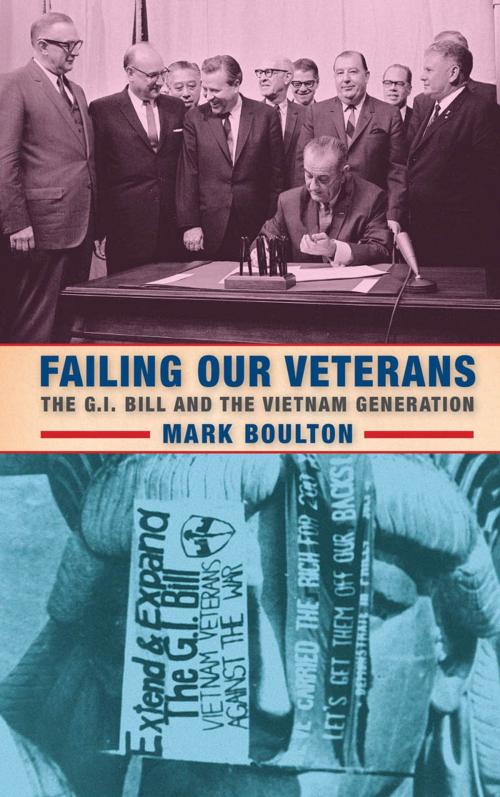Failing Our Veterans
The G.I. Bill and the Vietnam Generation
Nonfiction, History, Military, Vietnam War, Asian| Author: | Mark Boulton | ISBN: | 9780814770283 |
| Publisher: | NYU Press | Publication: | August 1, 2014 |
| Imprint: | NYU Press | Language: | English |
| Author: | Mark Boulton |
| ISBN: | 9780814770283 |
| Publisher: | NYU Press |
| Publication: | August 1, 2014 |
| Imprint: | NYU Press |
| Language: | English |
The original 1944 G.I. Bill holds a special place in the American imagination. In popular mythology, it stands as the capstone of the Greatest Generation narrative of World War II, a fitting reward for the nation’s heroes. Given the almost universal acclaim afforded the bill, future generations of warriors might well have expected to receive similar remuneration for their sacrifice. But when soldiers of the Vietnam conflict shed their fatigues and returned home to civilian life, they found that their G.I. Bills fell well short of what many of them believed they had earned.
In this first legislative history of the G.I. Bill during the Vietnam Era, Mark Boulton takes the story of veterans’ politics beyond the 1944 G.I. Bill as he seeks to uncover the reasons why Vietnam veterans were less well compensated than their predecessors. In crafting their legislation, both conservative and liberal politicians of the Vietnam era wrestled with fundamental questions about the obligations of American citizenship. What does it mean to serve one’s country? What does society owe those civilians it puts in uniform? Repeatedly, in answering those questions, lawmakers from both ends of the political spectrum found reasons to curb the generosity of the benefits offered.
The G.I. Bills should play a central role in our understanding of the Vietnam veteran’s post-service lives, just as they do for World War II veterans. Taking the story of the G.I. Bills beyond the World War II generation allows for a more complete understanding of the veteran experience in America.
The original 1944 G.I. Bill holds a special place in the American imagination. In popular mythology, it stands as the capstone of the Greatest Generation narrative of World War II, a fitting reward for the nation’s heroes. Given the almost universal acclaim afforded the bill, future generations of warriors might well have expected to receive similar remuneration for their sacrifice. But when soldiers of the Vietnam conflict shed their fatigues and returned home to civilian life, they found that their G.I. Bills fell well short of what many of them believed they had earned.
In this first legislative history of the G.I. Bill during the Vietnam Era, Mark Boulton takes the story of veterans’ politics beyond the 1944 G.I. Bill as he seeks to uncover the reasons why Vietnam veterans were less well compensated than their predecessors. In crafting their legislation, both conservative and liberal politicians of the Vietnam era wrestled with fundamental questions about the obligations of American citizenship. What does it mean to serve one’s country? What does society owe those civilians it puts in uniform? Repeatedly, in answering those questions, lawmakers from both ends of the political spectrum found reasons to curb the generosity of the benefits offered.
The G.I. Bills should play a central role in our understanding of the Vietnam veteran’s post-service lives, just as they do for World War II veterans. Taking the story of the G.I. Bills beyond the World War II generation allows for a more complete understanding of the veteran experience in America.















